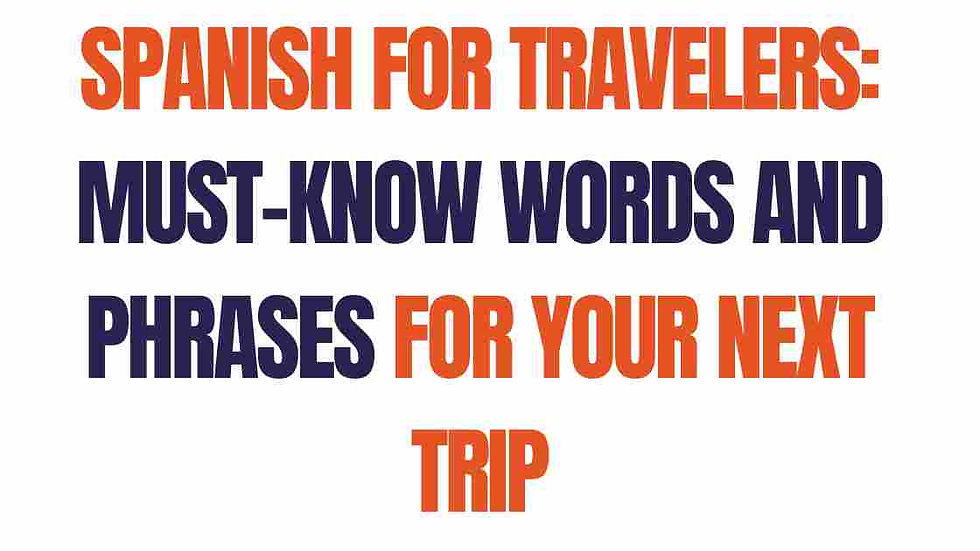Spanish for Travelers: Must-Know Words and Phrases for Your Next Trip
- Spanish Online Lessons
- Mar 29, 2024
- 4 min read
Hello Super Learners!
Welcome back to our exciting Spanish Super Tutor blog. In today's post, we're embarking on a linguistic journey that's perfect for all you globetrotters:
"Spanish for Travelers: Must-Know Words and Phrases for Your Next Trip".

Why is this indispensable for your adventure?
Traveling to Spanish-speaking destinations can be a thrilling experience, but it can also come with its own set of challenges, especially if you're not familiar with the language. Fear not! Equipping yourself with key Spanish words and phrases will not only enhance your travel experience but also help you navigate new environments with ease.
Whether it's asking for directions, ordering food, or seeking assistance, a little Spanish goes a long way.
In this post, we aim to provide you with the linguistic tools necessary for a smooth and enjoyable trip. And remember, if any of these phrases spark a deeper interest in learning Spanish, you can always book a private class or take advantage of our totally free consultation at Spanish Super Tutor. Let's dive in!
Basic Spanish Greetings and Courtesies
Mastering polite expressions can significantly improve interactions with locals.
"Hola, ¿cómo está?" (Hello, how are you?) A simple yet effective way to show courtesy and initiate a conversation.
"Muchas gracias por su ayuda." (Thank you very much for your help.) Expressing gratitude is always appreciated and can lead to friendlier exchanges.
Asking for Directions in Spanish
Getting lost can be part of the adventure, but knowing how to ask for directions is key.
"Disculpe, ¿dónde está el baño?" (Excuse me, where is the bathroom?) This question is essential for those moments when you need to find facilities quickly.
"¿Podría indicarme cómo llegar al museo?" (Could you tell me how to get to the museum?) An invaluable phrase for finding your way to local attractions.
Ordering Food and Drinks in Spanish
Savoring local cuisine is a highlight of traveling, so here's how to order with confidence.
"Me gustaría pedir el ceviche, por favor." (I would like to order the ceviche, please.) A polite way to place an order while showing appreciation for the local dish.
"Una cerveza más, por favor." (One more beer, please.) Whether you're at a beach bar or a city café, this phrase is sure to come in handy.
Present Tense Verbs in Spanish: Making the Most of Now
Conveying your current needs and actions is vital when traveling.
"Busco un hotel económico." (I'm looking for an affordable hotel.) Present indicative tense is used here, indicating an action you are currently undertaking.
"Viajo con amigos." (I'm traveling with friends.) Also in the present indicative, this lets others know about your travel companions.
Past Tense Verbs in Spanish: Sharing Past Experiences
Reflecting on your adventures can be a great way to connect with locals and fellow travelers.
"Ayer visité la ciudad antigua." (Yesterday, I visited the old city.) The simple past tense, perfect for recounting events that have already occurred.
"Probé la paella y me encantó." (I tried the paella and loved it.) This sentence is also in the simple past tense and expresses a completed action and reaction.
Future Tense in Spanish: Planning Ahead
Discussing future plans is exciting and useful when organizing activities or travel.
"Mañana iré a la playa." (Tomorrow, I will go to the beach.) Employing the future tense, this phrase sets out your intentions for the next day.
"¿Podremos hacer una reserva para esta noche?" (Could we make a reservation for tonight?) Using the future tense, this question helps you plan for dining or accommodation.
Closing Conversations in Spanish
Knowing how to end a conversation respectfully can leave a positive impression.
"Ha sido un placer hablar con usted." (It has been a pleasure speaking with you.) A warm way to conclude a conversation with someone you've just met.
"Hasta luego, que tenga un buen día." (See you later, have a good day.) This friendly farewell wishes the other person well and is suitable for any casual interaction.
Remember, learning Spanish for your travels isn't just about getting by; it's about immersing yourself in new cultures and creating meaningful connections. Today's resources for learning Spanish are vast, with online classes, free internet materials, and numerous teachers. However, our personalized approach at Spanish Super Tutor sets us apart, ensuring you don't just learn Spanish—you live it.
Make every trip a Spanish immersion!
By subscribing to our blog, each day brings a new opportunity to enhance your Spanish skills.
Miguel Marina
Spanish Super Tutor
In a world brimming with language learning resources, the ease of learning Spanish today is unmatched. From online classes to a plethora of free materials on the internet, and a multitude of teachers ready to assist you, there's never been a better time to dive into learning Spanish. But what truly sets Spanish Super Tutor apart is the personalized follow-up we provide to our students, making sure your journey in Spanish fluency is as smooth and enjoyable as possible.
Keywords: Spanish for Travelers, Basic Spanish Phrases, Learn Spanish, Spanish Vocabulary, Travel Spanish, Spanish Learning Blog, Spanish Immersion, Spanish Tenses













Comments